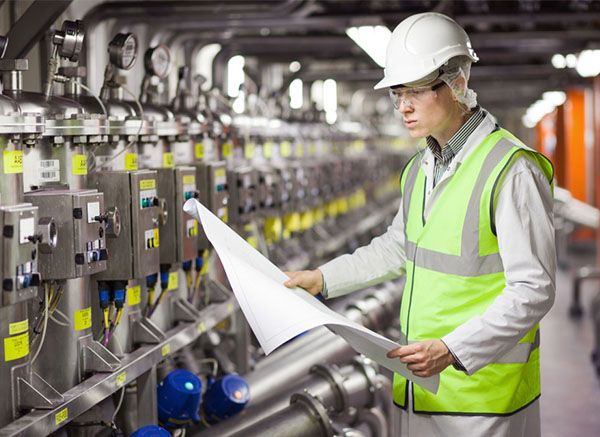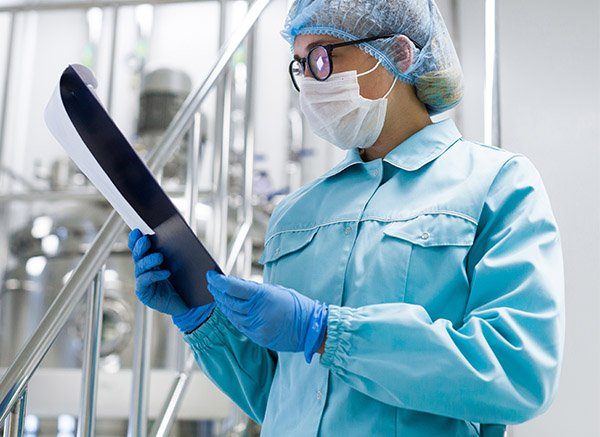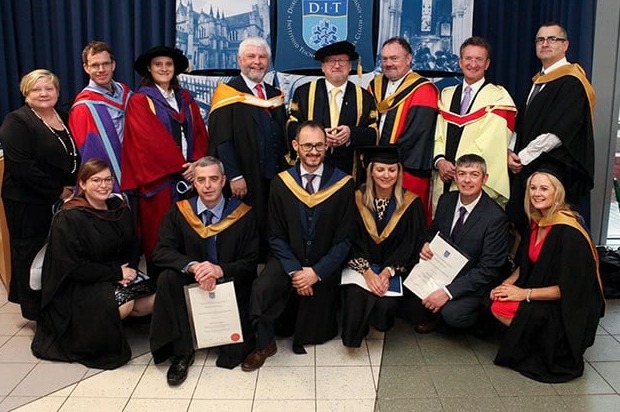This Program is Right For You If;
TU Dublin’s Minimum Entry Requirements
This program is university accreditated by TU Dublin, Ireland so you need one of the following to meet its entry requirements:
- You have a minimum of 1-year’s work experience in a Good Manufacturing Practice (GMP) manufacturing environment e.g:
- Pharmaceutical manufacturing
- Medical device manufacturing
- Nutritional, beverage, food or dairy manufacturing
- Or
- You have a relevant engineering or laboratory science degree.
Or - You have successfully completed our Conversion Course into Pharmaceutical Manufacturing.
If you don’t meet TU Dublin’s entry requirements, first take our Conversion Course into Pharmaceutical Manufacturing Programme.

Why choose the Certificate in eBioPharmaChem?
Study at a time and place that suits you
All materials are delivered asynchronously online, meaning that you never have to be available at a certain time or place to study. There are no zoom classes and no long commutes to a classroom.
Study at your own pace
Your individual materials will be released by your dedicated Course Coordinator who’ll keep a weekly check on your progress. So you’ll never feel like you’re rushing to keep up with others and you’ll never be in a position where you feel overwhelmed by what’s waiting for you when you log in.
You will always be working at a pace that is comfortable for you.
Get started now
There’s no need to wait until the next academic year, we have multiple course start dates throughout the year to fit in with the schedules of the professionals we’re working with.
Why choose GetReskilled?
Have your own “Personal Trainer”
You’ll be assigned a dedicated Course Coordinator who’ll work with you from day one until you successfully complete the programme. They’ll check your progress every Monday, help keep you on track, and serve as your single point of contact for any questions. And they’ll be your biggest supporter – our course coordinators pride themselves on knowing their students by name and do anything they can to help them succeed.
Award Winning Programmes
We’ve won pharma industry awards… we’ve won education sector awards… we even placed 2nd in a Europe-wide vocational training award. Our team has published research and presented at international conferences.
What new roles could I retrain for?
STEP 1: Take this Level 7 “University Certificate in eBioPharmaChem.
If you just started in an entry-level role (process operator, cleanroom operator) you could retrain for:
- Process Technician
- Chemical Process Technician
- BioProcess Technician
- BioProcess Associate
- Manufacturing Biotech Associate
And with more experience
- Senior Process Technician
- Production Supervisor
If you have a few years work experience and want to move away from manufacturing roles:
- Quality Assurance Specialist – Some companies call this role:
- Quality Assurance Associate
- Quality Assurance (QA) Technician
- QMS/QA Specialist
- Quality Systems Coordinator
- Documentation Specialist – Some companies call this role:
- Document Controller
- Documentation Coordinator
- Validation Technician – Some pharma companies call this role:
- Associate QA Validation Specialist
- Equipment Validation Specialist
- QA Validation Associate
- QA Validation Specialist
- CQV Specialist – Some pharma companies call this role:
- CQV Engineer
- C&Q Specialist
- C&Q Junior Project Manager

Study all the way to a degree
Once you have completed the University Certificate in eBioPharmaChem Manufacturing, take the next steps to build your qualification all the way to a degree.
STEP 2: Then you can take our Level 7 Certificate in Validation program to move into more senior validation roles with a higher salary. Typical roles
- Senior Validation Technician
- CQV Technician
And with more work experience
- Validation Engineer
- Process Validation Engineer
- Cleaning Validation Engineer
STEP 3: If you have completed our University Certificate in eBioPharmaChem Manufacturing and University Certificate in Validation which are standalone programs, you are already halfway to a Level 7 Degree. Take 6 more modules to get a BSc degree in Degree in Manufacture of Medicinal Products (DT 291)

Your 37-week class schedule
The core content of these modules was developed in consultation with the pharma industry including Pfizer and MSD.
Module 1 – Fundamentals of Pharmaceutical Manufacturing Technologies
This module will give you a broad understanding of pharmaceutical manufacturing technologies, the rules that govern manufacturing and the guidelines on how these rules are applied along with the risk management tools to be used when making decisions that could impact the safety of the medicines being manufactured.
Module 2 – Advanced Writing Skills
This module will give you the written communications skills to properly write reports and reference and cite source material in a manner that is consistent with the professional norms of this industry.
Module 3 – Commissioning & Qualification of Equipment and Systems (VOMP 3002)
This program explains the engineering documentation used to specify and design equipment or systems in a manufacturing facility – and how to develop an IQ OQ PQ validation test protocols to ensure that it operates as intended and meets the regulatory requirements.
Module 4 – Chemistry for API’s (VOMP 3003)
This module will provide a foundation in the general chemistry necessary to understand the fundamental concepts involved in the chemistry of API (Active Pharmaceutical Ingredients) required for the manufacture of medicinal products.
Please note: This module is run as a group module (3 times a year) and you will be required to keep pace with the class during the running of this module. This is the only module that you won’t be able to control the pace of your study on.
Theory
Week 25 – Chemistry and Matter; Atomic Theory
Week 26 – The Periodic Table and Bonding
Week 27 – Stoichiometry
Week 28 – Acids and Bases Recrystallisation
Week 29 – Introduction to Organic Chemistry
Laboratory – Due to Covid 19, all laboratory sessions have been modified to be delivered 100% online.
Week 30 – Overview of Safety in Chemical Laboratories
Week 31 – Virtual Practical 1 – Separation of a 3 component mixture
Week 32 – Virtual Practical 2 – Synthesis of Aspirin
Week 33 – Virtual Practical 3 – Preparation for Volumetric Analysis
Week 34 – Virtual Practical 4 – Analysis of Baking Soda
Week 35 – Revision Week
Week 36 – Online Exam
Price & Start Dates
Or $799/month for 10 months.
Price Includes:
- End of week progress checks by us to MAKE SURE you finish the program
- University accreditation by Technological University (TU) Dublin, Ireland
- Delivered online so you can learn from home (or anywhere) on your own schedule
- Robust job hunting program that will help you find a job
- Regular & ongoing access to a dedicated career coaching counsellor
No Hidden Fees
- No application fees
- No registration fees
- No resource/book fees
- No graduation fees
- No certificate fees
Please Note: This price is only available to tax residents of Ireland.
Or €299/month for 10 months.
Price Includes:
- End of week progress checks by us to MAKE SURE you finish the program
- University accreditation by Technological University Dublin (TU Dublin), Ireland
- Delivered online so you can learn from home (or anywhere) on your own schedule
- Robust job hunting program that will help you find a job
- Regular & ongoing access to a dedicated career coaching counsellor
No Hidden Fees
- No application fees
- No registration fees
- No resource/book fees
- No graduation fees
- No certificate fees
Save 60% off the Price
Reduced from € 6,499 to € 2,580 if you move and live in Ireland.
Over 6,000 new pharma jobs available over the next 3 Years
Or €699/month for 10 months.
Price Includes:
- End of week progress checks by us to MAKE SURE you finish the program
- University accreditation by Technological University Dublin (TU Dublin), Ireland
- Delivered online so you can learn from home (or anywhere) on your own schedule
- Robust job hunting program that will help you find a job
- Regular & ongoing access to a dedicated career coaching counsellor
No Hidden Fees
- No application fees
- No registration fees
- No resource/book fees
- No graduation fees
- No certificate fees
Save 60% off the Price
Reduced from £ 5,999 to € 2,580 if you move and live in Ireland.
Over 6,000 new pharma jobs available over the next 3 Years
Or £649/month for 10 months.
Price Includes:
- End of week progress checks by us to MAKE SURE you finish the program
- University accreditation by Technological University Dublin (TU Dublin), Ireland
- Delivered online so you can learn from home (or anywhere) on your own schedule
- Robust job hunting program that will help you find a job
- Regular & ongoing access to a dedicated career coaching counsellor
No Hidden Fees
- No application fees
- No registration fees
- No resource/book fees
- No graduation fees
- No certificate fees
Price & Start Dates
Or €699/month for 10 months.
Price Includes:
- End of week progress checks by us to MAKE SURE you finish the program
- University accreditation by Technological University (TU) Dublin, Ireland
- Delivered online so you can learn from home (or anywhere) on your own schedule
- Robust job hunting program that will help you find a job
- Regular & ongoing access to a dedicated career coaching counsellor
No Hidden Fees
- No application fees
- No registration fees
- No resource/book fees
- No graduation fees
- No certificate fees
Please Note: This price is only available to tax residents of Ireland.
Or €299/month for 10 months.
Price Includes:
- End of week progress checks by us to MAKE SURE you finish the program
- University accreditation by the Technological University (TU) Dublin, Ireland
- Delivered online so you can learn from home (or anywhere) on your own schedule
- Robust job hunting program that will help you find a job
- Regular & ongoing access to a dedicated career coaching counsellor
No Hidden Fees
- No application fees
- No registration fees
- No resource/book fees
- No graduation fees
- No certificate fees
Or $799/month for 10 months.
Price Includes:
- End of week progress checks by us to MAKE SURE you finish the program
- University accreditation by Technological University (TU) Dublin, Ireland, Ireland
- Delivered online so you can learn from home (or anywhere) on your own schedule
- Robust job hunting program that will help you find a job
- Regular & ongoing access to a dedicated career coaching counsellor
No Hidden Fees
- No application fees
- No registration fees
- No resource/book fees
- No graduation fees
- No certificate fees
Or £649/month for 10 months.
Price Includes:
- End of week progress checks by us to MAKE SURE you finish the program
- University accreditation by Technological University (TU) Dublin, Ireland, Ireland
- Delivered online so you can learn from home (or anywhere) on your own schedule
- Robust job hunting program that will help you find a job
- Regular & ongoing access to a dedicated career coaching counsellor
No Hidden Fees
- No application fees
- No registration fees
- No resource/book fees
- No graduation fees
- No certificate fees
Price & Start Dates
Please Note: This price is only available to tax residents of Ireland.
Or €299/month for 10 months.
Price Includes:
- End of week progress checks by us to MAKE SURE you finish the program
- University accreditation by Technological University Dublin (TU Dublin), Ireland
- Delivered online so you can learn from home (or anywhere) on your own schedule
- Robust job hunting program that will help you find a job
- Regular & ongoing access to a dedicated career coaching counsellor
No Hidden Fees
- No application fees
- No registration fees
- No resource/book fees
- No graduation fees
- No certificate fees
Price & Start Dates
Or £649/month for 10 months.
Price Includes:
- End of week progress checks by us to MAKE SURE you finish the program
- University accreditation by Technological University Dublin (TU Dublin), Ireland
- Delivered online so you can learn from home (or anywhere) on your own schedule
- Robust job hunting program that will help you find a job
- Regular & ongoing access to a dedicated career coaching counsellor
No Hidden Fees
- No application fees
- No registration fees
- No resource/book fees
- No graduation fees
- No certificate fees
Please Note: This price is only available to tax residents of Ireland.
Or €299/month for 10 months.
Price Includes:
- End of week progress checks by us to MAKE SURE you finish the program
- University accreditation by Technological University Dublin (TU Dublin), Ireland
- Delivered online so you can learn from home (or anywhere) on your own schedule
- Robust job hunting program that will help you find a job
- Regular & ongoing access to a dedicated career coaching counsellor
No Hidden Fees
- No application fees
- No registration fees
- No resource/book fees
- No graduation fees
- No certificate fees
Or €699/month for 10 months.
Price Includes:
- End of week progress checks by us to MAKE SURE you finish the program
- University accreditation by Technological University Dublin (TU Dublin), Ireland
- Delivered online so you can learn from home (or anywhere) on your own schedule
- Robust job hunting program that will help you find a job
- Regular & ongoing access to a dedicated career coaching counsellor
No Hidden Fees
- No application fees
- No registration fees
- No resource/book fees
- No graduation fees
- No certificate fees
Or $799/month for 10 months.
Price Includes:
- End of week progress checks by us to MAKE SURE you finish the program
- University accreditation by Technological University Dublin, Ireland
- Delivered online so you can learn from home (or anywhere) on your own schedule
- Robust job hunting program that will help you find a job
- Regular & ongoing access to a dedicated career coaching counsellor
No Hidden Fees
- No application fees
- No registration fees
- No resource/book fees
- No graduation fees
- No certificate fees
Application Deadline: Wednesday 9th July
Program Starts: 16th July
The application process is a 5 step process:
- Complete the application form – click on the big red “Apply NOW” button.
- Speak to a course advisor – they will let you know if you’re a good fit for the program and answer any questions you have.
- Complete the registration form – you’ll be sent this by email after you’ve spoken to a course advisor
- Make payment – successful applicants will then make payment. It is only at this stage that a place on the course is secured. Payments can be made in full or set up as monthly instalments to fit your budget.
- Begin your course!
We’ll be right there with you every step of the way. If you have any questions, please get in touch!
Hear from people who taken this program

Regina McNamara
Previous Background:
Professional Painter
“I can study around work and family commitments”
I’d recommend this course to anyone that wants to work in the Pharmaceutical and Medical Device Manufacturing industry and is interested in building a successful career in this area. The online experience is working well for me as I study around work and family commitments.
The companies I applied for were very impressed. I am currently working in Boston Scientific manufacturing Balloon Catheters for Gallstone patients.

Mehmet Hascan
Previous Background:
Technical Support
“Material was delivered in an engaging, interesting and supportive way”
Having faced a career change in the middle of an economic downturn, I lost some of myself confidence and needed a major boost. The area of Biopharmaceutical operations and validation was of interest to me as it does play an important role in the pharmaceutical industry at present.
I have now been working at Johnson and Johnson Vision Care as a Validation Engineer and I look forward to putting what I have learned into practice.

Sharon Egan
Previous Background:
Food Manufacturing
“Structurally well planned with the opportunity for practical application”
I found the course to be interesting, and structurally well-planned with the opportunity for practical application of the course modules through various assignments.
I have worked in the Medical Device/Pharmaceutical and Food industries and found the course to be extremely relevant to all industries.
Agnes Hove
Domagoj Wunderlich
Patricia Radulescu
Kieran Mac Namara
Delivered by industry experts
Dr. Joe Brady
Full-Time Validation Lead
Lecturer, Technological University Dublin
Senior Associate, GetReskilled
Dr. Joe Brady is a full-time practicing Validation Lead and an assistant lecturer with Technological University Dublin (TU Dublin), in the School of Chemical and Pharmaceutical Sciences. Joe is a certified trainer and highly experienced in competency-based training. He designs and prepares educational modules and full academic programs ranging from MSc, MEngSc. BSc, to Certificate level, for a range of academic institutions.
He is also a supervisor for MSc/MEngSc and Ph.D. theses. Joe has over twenty years of project experience in the pharmaceutical, biopharmaceutical, and medical device industries in Ireland, Singapore, China, The Netherlands, France and the USA.
Professor Anne Greene
Senior Lecturer, Technological University Dublin
Professor Anne Greene is a Senior Lecturer in Pharmaceutical Technology, Validation and Pharmaceutical Quality Assurance to undergraduate and postgraduate students and a Pharmaceutical Projects Manager at Technological University Dublin, Ireland.
In addition, Anne is the Director of the Pharmaceutical Regulatory Science Team and is also secretary of the Parenteral Drug Association (PDA) Secretary, Irish Chapter. Her experience ranges from a technical service chemist, Sterling Wintrop Dungarvan, (now GSK), validation manager at startup Wyeth Newbridge, (now Pfizer) and is a Training Director at NIBIRT in Ireland.
How We Deliver Our Online Courses without ZOOM Classes
With every GetReskilled ONLINE program:
- We use one centralized platform (Moodle) where you can log into your classroom anytime. Each week, you’ll watch videos and complete quizzes, tests, interactive activities, and projects. Course materials are available 24/7, and there are no scheduled Zoom classes, so you can study whenever it suits you—for example, after the kids have gone to bed, on the weekend, or whenever you have free time.
- Your working schedules are unpredictable, so we offer flexible delivery. Slow down, speed up, or pause the delivery of the program as needed.
- We release only one week’s worth of material at a time and manually check your activity logs at the beginning of every week to make sure you’re on track.
- You’ll also get a dedicated course leader who will:
- Help you create a weekly study plan
- Answer any questions
- Check your progress every Monday
- Follow up regularly to support you through to completion
This all helps us to spot any potential issues early and helps you completely finish the program.
Meet your online classroom support team
We have a team of in-house experts to provide guidance and support, whenever you need it.
Career Coaching

Meet Claire who runs GetReskilled’s Advanced Career Coaching Programme – our specially devised job hunting course that helps our trainees take that final step into employment by leading them through the job hunting process.
Classroom Support Team

Your Course Leaders, Coordinators, and members of the Classroom Support Team are here to provide you with answers, tips, and are going to check your progress weekly to keep you on track and will reach out to you by email or even by phone if you fall behind!
13 frequently asked questions
So let’s get started…
Contact Details For This Course
Geraldine Creaner
Got more questions?

Hi, I’m Donagh Fitzgerald. Chat with me live anytime – just click the blue chat bubble in the bottom-right corner of the page.
I’m online Monday to Friday during working hours (Irish/UK time).
If I’m away from my desk, leave a message and I’ll get back to you as soon as I can.
Or you can fill out the form below and we’ll reply within one working day.


